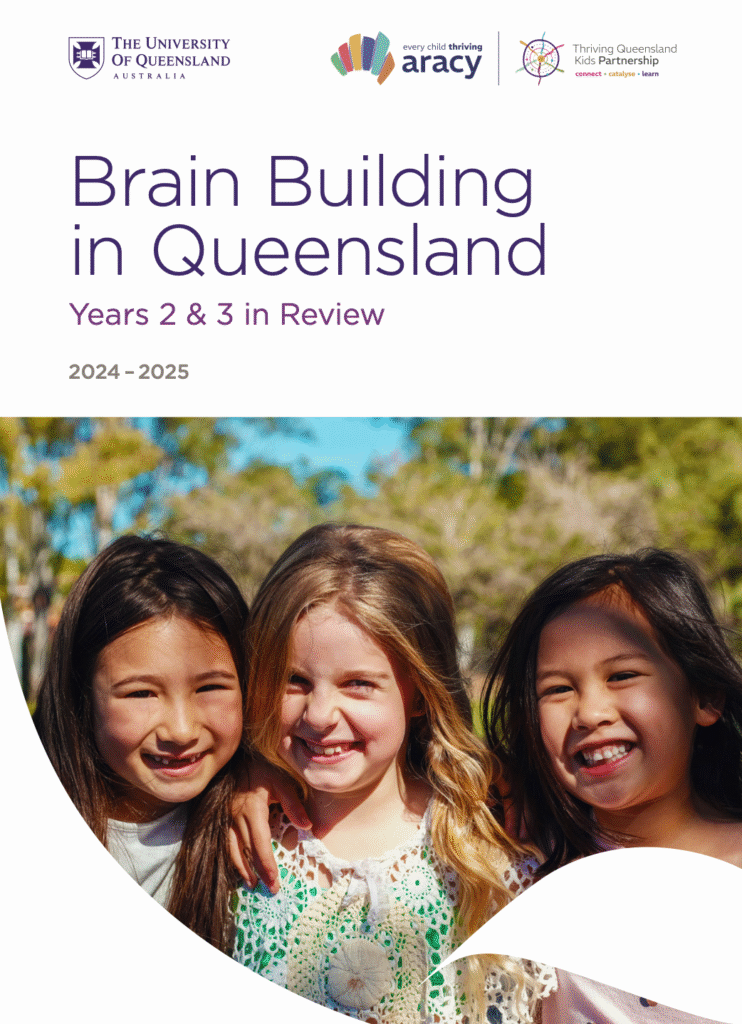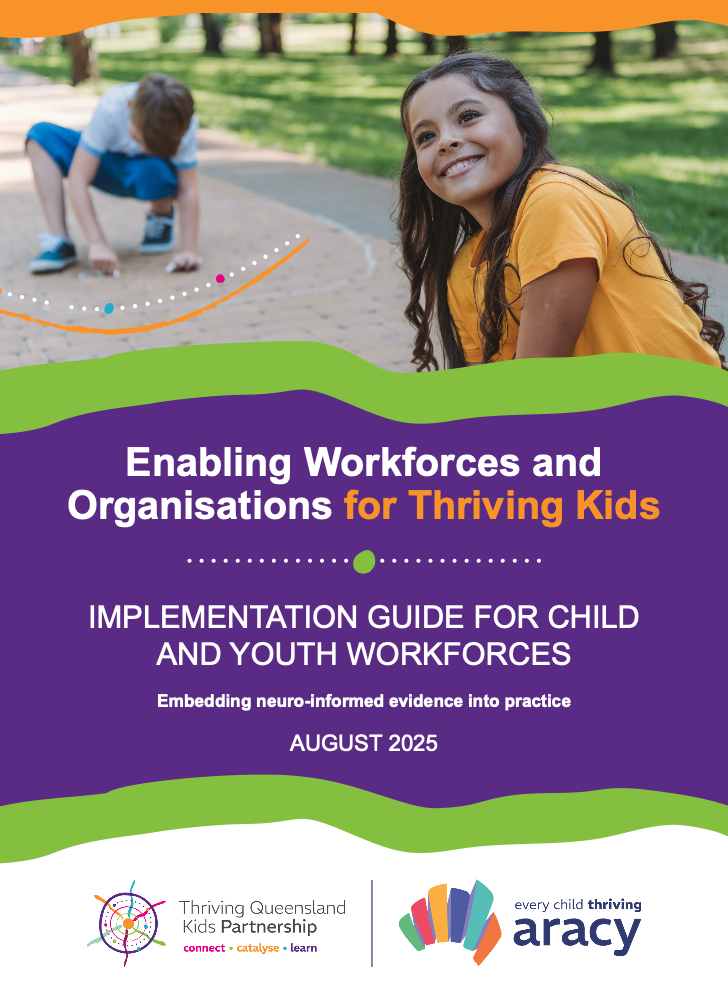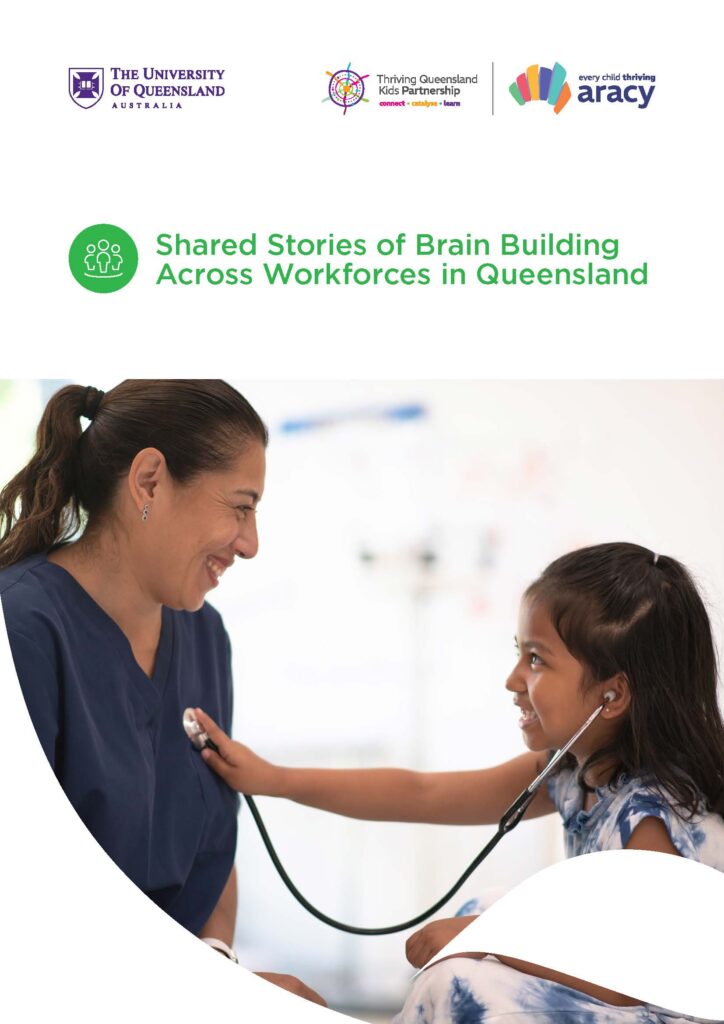Brain Building in Queensland, Years 2 & 3 in Review, 2024 – 2025

When our caregivers and communities – and our schools, health and other services – are informed by neuroscience we can build healthier brains and bodies and improve learning, wellbeing and resilience. The Thriving Kids Brain Builders Initiative (TKBBI) is directly supporting child development in Queensland by applying neuroscience to improve practice and connection across the systems that support children, young people and their families. […]
Implementation Guide – Enabling Workforces & Organisations for Thriving Kids

Enabling Workforces and Organisations for Thriving Kids is an initiative of Thriving Queensland Kids Partnership (TQKP) in collaboration with Emerging Minds, Yiliyapinya Indigenous Corporation, the Queensland Brain Institute at The University of Queensland and Dovetail – as part of Insight, supported by the Queensland Mental Health Commission (QMHC). Purpose of the Enabling Workforces and Organisations […]
Shared Stories of Brain Building in Queensland

Shared Stories of Brain Building Across Workforces in Queensland provides real-life examples of how Queensland professionals in a range of sectors are applying the latest neuroscience and brain health knowledge to create the optimal conditions for children’s mental, physical, social, emotional and cognitive development from the early years onwards. These stories exemplify the growing application […]
The Brain in Context: A Scoping Review and Concept Definition of Neuro-Informed Policy and Practice

This scoping review examined the use and conceptualisation of neuro-informed policy and practice (NPP) over the last two decades. It highlights the importance of defining the concept of neuro-informed policy and practice, extending beyond the brain or individual in isolation to include consideration of the brain in context. Authors include the Queensland Brain Institute, The […]
‘We are brain builders’ flyer

This 2-page A4 flyer, highlights the 6 core metaphors developed as part of The Brain Story, reproduced with permission from our partners at the Alberta Family Wellness Initiative. The flyer has been created to support our aims to equip as many people as possible with proven tools to embed neuroscience in our communities to support […]
The Experience of Trauma by Queensland children

Prepared as a consultation paper to contribute the development of the Queensland Trauma Strategy. Prepared by: Sophie Morson, Michael Hogan, Thriving Queensland Kids Partnership What is this research about? This paper outlines key insights from well-established and emerging evidence and expertise about trauma in childhood (5-12 years). This includes its incidence and impact, and implications […]
‘What surrounds us shapes us’: A framework for building children’s resilience to thrive in life

‘What surrounds us shapes us’: A framework for building children’s resilience to thrive in life introduces the Resilience Scale as a model for understanding the impact of environment and experiences on children’s brain health. Using ARACY’s The Nest framework, it provides examples of what children need to thrive. Transcript: When it comes to building resilience, what […]
We are all brain builders: Enabling workforce and organisational capability and system change

A webinar hosted by Paul Ramsay Foundation and presented by Thriving Queensland Kids Partnership on 27 March 2024. The webinar explores how brain building can be applied at a systems, organisational and individual level and featured a panel with: Kids Partnership gratefully acknowledges Paul Ramsay Foundation as a valued philanthropic partner in our efforts to […]
Leading Reform Summit 2023 – TQKP Presentation

Address from Michael Hogan, Convenor, Thriving Queensland Kids Partnership at the Queensland Mental Health Commission, Leading Reform Summit 2023. Presentation topic: “Catalysing systems to change the odds for Queensland children and young people to thrive”
Brain Builder Workforces: The Neuro-informed Policy and Practice Framework

We are all Brain Builders Every time we interact directly or indirectly, via systems and services, with a child, young person or their family we are helping to build brains. For this reason, understanding brain development is important in supporting children and young people to thrive. We know that the best outcomes for children, families […]